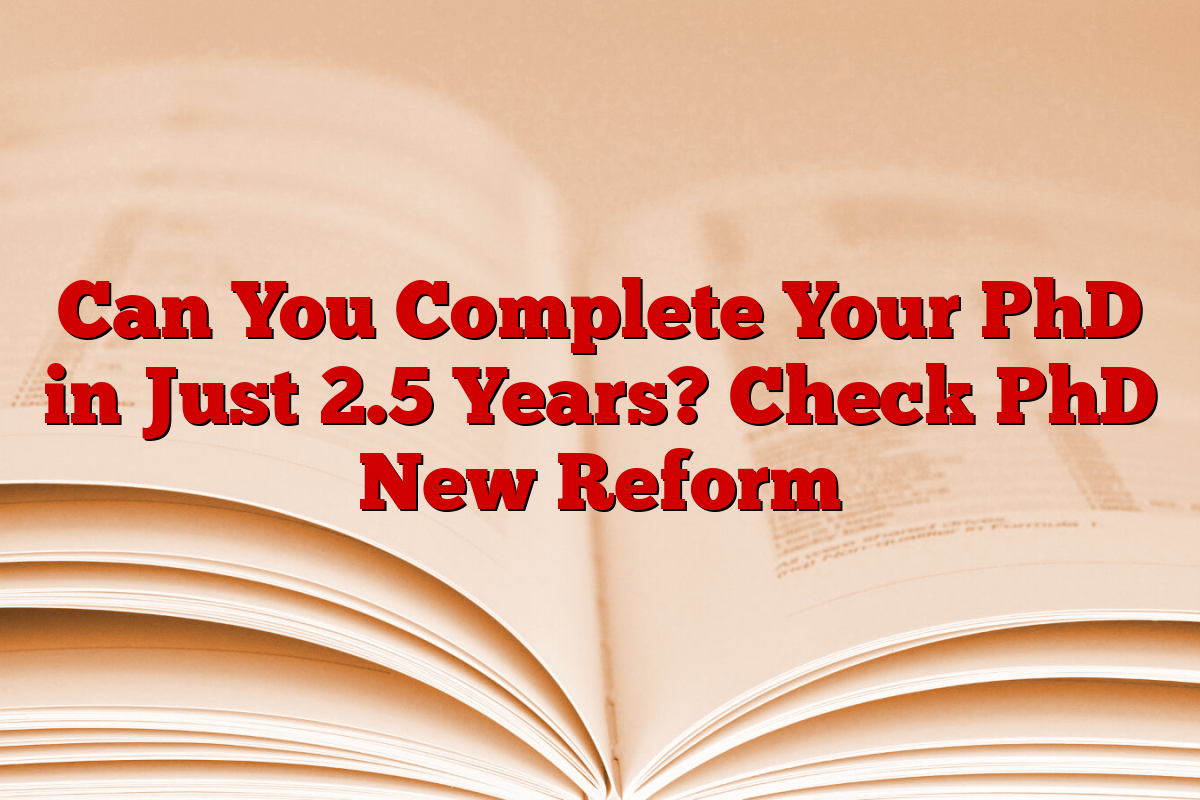Imagine that your PhD will be completed not in a long time of five or seven years, but in just two and a half years, the same period taken by scholars in countries like the United States, Germany and Australia. The All India Council for Technical Education (AICTE) is working on a revolutionary change that can make this a reality for Indian researchers.
This bold move aims to bring Indian doctoral research in technical education closer to global standards by reducing PhD duration, improving research quality and streamlining funding processes. The proposal also signals a major structural change, where AICTE could replace the UGC in the management of technical PhDs, making research faster, more efficient and more transparent.
Latest Updates on PhD Admission
AICTE’s proposal to introduce a 2.5-year PhD model could mark the most transformative reform in India’s higher education sector in decades. Check Details Here
| key points | Description |
|---|---|
| Regulatory body introducing reforms | All India Council for Technical Education (AICTE) |
| New PhD period | 2.5 years |
| focus area | Technical and Engineering Disciplines |
| leading Change | AICTE will manage technical PhD, replacing UGC in these fields |
| requirement of publication | At least one Scopus Q1-indexed journal article |
| Use of Artificial Intelligence | Allowed with citation and ethical compliance |
| supervisor eligibility | Active and retired professors eligible |
| Implementation Timeline | Expected from July 2025 |
| main objective | Improve efficiency, global equity and research quality |
| Expected Result | Shorter PhD duration, faster funding, increased global competitiveness |
What is the new PhD change?
AICTE has proposed to reduce the timeline for completing PhD from 5 years to 2.5 years for candidates pursuing research in technical subjects. This change will redefine how PhDs are managed, funded and evaluated in India. The main points of this new change are as follows:
- PhD duration reduced to 2.5 years: scholars will be able to complete their doctoral research within half the traditional time.
- Mandatory Publication Requirement: Candidates must publish at least one research paper in a Scopus Q1-indexed journal before submitting the thesis.
- Use of AI in Research: Scholars can use artificial intelligence tools for research, data analysis and writing while ensuring proper citation and academic integrity.
- Retired professors as mentors: For the first time, retired professors can act as PhD supervisors, offering their experience and guidance.
- Change in oversight: Technical PhDs may come under the purview of AICTE instead of the University Grants Commission (UGC), creating a dedicated structure for technical research.
- Formation of a task force: A special committee has been formed under the leadership of Dr. Venu Gopal, former Chancellor of Bor University, to prepare a new framework for this model.
What benefits will the new PhD changes bring?
This proposed reform is not just about shortening the timelines, it is about changing the quality, pace and global relevance of PhD programmes. Here’s how this will benefit scholars and the academic ecosystem:
- Accelerated career development: Completing a PhD in 2.5 years allows scholars to enter the job market or post-doctoral opportunities faster, increasing employability.
- Improved research efficiency: The use of AI and strict publishing standards will lead to high-quality, impactful research within shorter time frames.
- Simplified Funding and Management: AICTE aims to reduce the delays in research funding and stipend disbursement that often plague the UGC’s system.
- Global benchmarking: Aligning India’s PhD duration with international standards will improve opportunities for recognition and global collaboration.
- Strong Guidance: Engaging retired professors as mentors ensures that students receive experienced supervision and personal attention.
- Promotion of technical disciplines: This initiative focuses on technical and engineering related PhDs, ensuring better guidance, structured progression and innovation-driven research.
How is it different from a traditional PhD?
Let us understand how this new model is different from the traditional PhD structure in India:
| aspect | Traditional PhD (UGC) | New AICTE PhD Model |
|---|---|---|
| Duration | 5 to 7 years | 2.5 years |
| regulatory body | University Grants Commission (UGC) | All India Council for Technical Education (AICTE) |
| focus area | Humanities, Social Sciences, Science | Technical and Engineering Disciplines |
| requirement of publication | often optional | Mandatory Scopus Q1-indexed publications |
| supervisor eligibility | Only active faculty | Retired professors also eligible |
| Use of AI in research | Limited | Ethical use encouraged |
| Funding and Management | Managed by UGC; there are often delays | Managed by AICTE; expected to be organized |
Who will get the benefit?
This change will mainly benefit students and professionals associated with technical and engineering education in India.
- PhD aspirants in technical areas: Those pursuing research in Computer Science, Mechanical, Civil, Electrical or related subjects will benefit from faster completion and AICTE funding.
- Working professionals and researchers: Professionals looking to pursue a doctoral degree while balancing a career will find this model more practical and goal-oriented.
- Retired Academicians: Experienced retired professors can now work as consultants, contributing to the academic ecosystem without administrative hassles.
- Institutions of Higher Education: Universities and institutions under AICTE will see an increase in quality research, publication output and international collaboration.
- India’s Research Ecosystem: Overall, this transformation will strengthen India’s position in global research rankings, attract international partnerships and promote innovation-led education.
sharing is Caring!

